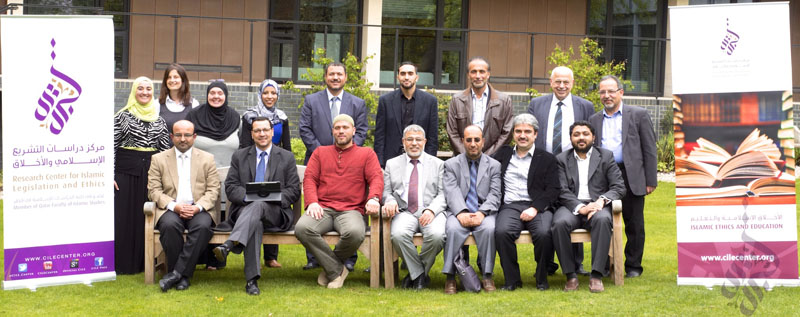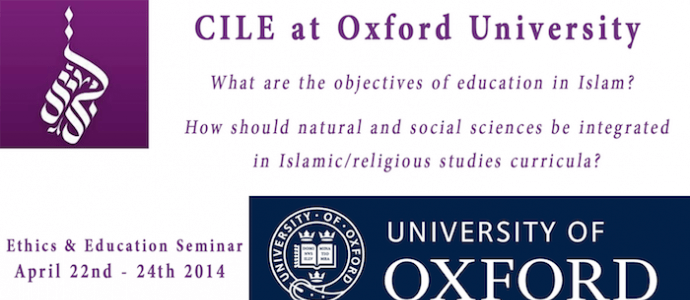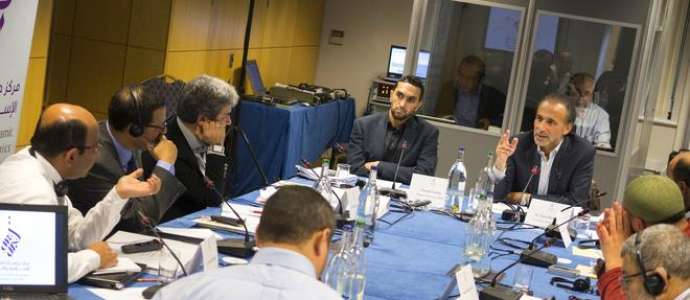
The Research Center for Islamic Legislation and Ethics (CILE) organized a scholarly seminar entitled “the Islamic Ethics and Education” for three days from April 22nd to April 24th, 2014 at Oxford University, UK. A number of scholars, thinkers and experts of education participated in this seminar from Arab and European countries including Britain, France, Germany, Belgium, Morocco, Yemen, Jordan, Turkey and Egypt. Other participants also included the executive director, deputy director and some of the personnel of CILE at Doha, Qatar.
Prof. Tariq Ramadan CILE’s Executive Director and Professor of Contemporary Islamic Studies in Oxford University, Britain, opened the seminar welcoming the participants and attendees. Earnestly, he emphasized the importance of such seminar in promoting root intellectual ideas and developing discussions on strategic issues. He then gave the floor to Chauki Lazhar, CILE Deputy Director, who introduced briefly the Research Center for Islamic Legislation and Ethics (CILE) in terms of vision, mission and goals with emphatic indications to CILE's efforts in drawing connections between the scholars of texts and those of context to shun imperfections that befall the processes of creative legal reasoning, thinking, theorization and application in CILE's twelve areas of research including education, politics, economics, psychology, media, biomedical ethics, environment and other areas.
The seminar moderator, Dr. Fethi Ahmed, took the floor and delivered the inaugural speech.
Notably, he highlighted CILE's attempts to tackle some areas of Islamic thought and legacy in its serious endeavors to respond to the major questions that face the Muslim Ummah in a unique approach combining tradition, modernity and creative intellectual models of thought within the major maqasid (Objectives of Shari‘ah) system of Islam with focus on the central role of ethics in all areas of life.
Dr Ahmed set the seminar in its right context stating that it comes within the CILE's care for education as a backbone of all comprehensive activities of reform. It tries to provide answers for two specific questions: One is theoretical, which is: what are the higher objectives of education in Islam? The other is practical, which is: what is the optimal approach for introducing the natural and social sciences into the Islamic studies programs?
The seminar moderator then stated that theorization, produce of ideas and coinage of new terms are highly significant but right application, choice of right approach and appropriate technologies are necessary underpinnings. It is also necessary to coin and translate ideas, theories and new terms in practical programs, curricula and modules for the formation of the desired intellect, child personality and man to prove successful and creative in scientific and practical life. Thus fulfill the duties of human stewardship over earth.
It has also been emphasized that the exact distribution of the seminar program over three days shows CILE's due care for quality dialogue and discussion as well as exchange of ideas and views on the theme of the seminar and the questions posed. The time designated for discussion nearly doubles the time devoted for presenting researches and comments. In addition, each research presented to the seminar is reviewed by a specialized professor, which enriches dialogue, deepens serious scholarly debates and helps positive interaction among the scholars, thinkers and attendees for the achievement of the seminar goals.
The seminar's first day (April 22nd, 2014) has included two research papers; the first was presented by Prof. Dr. Said Ismail Ali, Professor of Educational Foundations, Ain-Shams University, Egypt, entitled “High Objectives of Islamic Education” followed with comments by Dr. Farid Panjwani, a Senior Lecturer and Director of Islamic Education Studies at the Institute of Education, University of London, UK. The second was presented by Dr. Ahmed Daghashi, Professor of Islamic Educational Foundations and Philosophy, Faculty of Education, Sana'a, Yemen, entitled “Higher Objectives of Education and Training in Islam: A Critical and Theoretical Study” followed with comments by Mr. Ömer Korkmaz, Director of Education and Curricula, Suffa Institute for Human Studies in Istanbul, Turkey.
The second day (April 23rd, 2014) has included two practical research papers; the first by Sheikh Hafiz Sulayman Van Ael, Lecturer of Theological Doctrines, Islamic University of Rotterdam, Holland, entitled “Integration (Idmaj) of Natural Sciences into Religious Sciences” and Prof. Dr. Ahmad Jaballah, Director of the European Institute of Human Sciences, Paris France, has commented on it. The second research was presented by Prof Dr. Khalid Samadi, Team Leader of Knowledge and Values Research Group at the Moroccan Center for Studies and Educational Researches and the Advisor of the Head of Government of the Kingdom of Morocco. His paper is entitled “The Complementarity Between Knowledge and Values in the Educational Curricula: A Theoretical Approach and Applied Projects” followed with comments by Dr. Khalid Hanafi, Dean of EIHW, Frankfurt, Germany.
On the final day, Mr. Ömer Korkmaz, Director of Education and Curricula, Suffa Institute for Human Studies in Istanbul, Turkey, presented a research paper on “The Turkish Experience in Merging the Islamic Subjects and the Natural Subjects in High Schools.” At last, all professors, researchers and attendees reflected deeply in pure moments of contemplations on the themes, questions and issues raised and presented in the previous two-day discussions to give recommendations of which the following are most important:
• Education and ethics are absolutely inseparable in Islam; they have a universal dimension from the Islamic perspective and inclusive vision of universe and life.
• Integration of religious knowledge with natural and social sciences is necessary apart from the actual merging, as it is necessary to keep the independence and distinction of sciences in terms of themes, approaches, concepts and terms.
• Methodological determination of terms is highly essential, such as the relationship between purposes and ends and standardizing the determination of ends and purposes to fall under evaluation and application bearing in mind that, as Muslims, our educational vision competes with other visions.
• It is necessary to re-examine and explore the higher objectives of education in the sources of revelation: the Qur’an and the Sunnah, by help of traditional books and early sources to formulate these objectives in a vision not only compliant with Muslim needs but also capable of competing with other worldviews.
• It is necessary to undertake a real bibliographical survey of written literature, Islamic and non-Islamic, on the education and ethics and to translate the relevant Arabic literature into English.
• It is significantly important to inventory and study the educational experiences and projects of educational reform in the Arab and Muslim worlds, such as the experience of International Islamic University in Malaysia, the Islamic University in Pakistan and the experiences of Islamic education in Turkey, Morocco and other countries as well as other non-Islamic religious experiences on the same theme. It is also necessary to conduct interviews with experts of other religions for deeper discussion to avail ourselves of their knowledge and discover the points of difference between their views and ours in order to designate the defects and avoid them while being cautiously on guard and prudently wise in dealing with the ideas, concepts and systems that have been produced and developed by other nations.
• Given the fact that some experiences have special characteristics as to their special realities and evidently different perceptions in determination of concepts and terms, it is not an excuse for being trapped in vicious circle; we should rather have a starting point and a launching process to work out the problems from the premises, which is partly the foundation of scholarly methodology wherein an available opportunity appears for later evaluation and amendment.
• It is necessary to study the values, standardize their order in the value system, explain the nature of the relationship between the values and education and review the relevant literature on ethics.
• Thinking of all possible solutions for the treatment of the crisis of religious education. Evidently, this education must be led in accordance with the higher objectives of Islam and we should build into the children's mind that their pursuit of knowledge should be for the sake of knowledge and undertaking the responsibility for their personalities to be well balanced and reliant on knowledge, skills and values. We should also encourage their spirit of free research and examination and work on correcting the mission of educational institutions to have education and ethics as their highest end beyond trade and money.
• The imams, muftis and other specialized scholars should simplify sciences and knowledge for people and demonstrate practical ideals of the messages they promulgate to affect and educate people efficiently.
• Stressing the importance of the higher objectives of education as deduced from the knowledge sources of Islam, including the Qur’an, the Sunnah, the early Muslim heritage and similar sources. The theory of maqasid (Objectives of Shari‘ah) should be seen as an excellent theory and a noble contribution to the human thoughts. Broadly speaking, it is humane and universal as it offers a great service to the world by means of guidance and advice in isolation from useless memorization and brainwashing. The higher objectives as suggested by the participants may be epitomized as follows:
1. Developing the perceptive faculty: that is to develop the powers of mind and perception including the faculties of comprehension, analysis, contemplation and meditation and avoid blind imitation.
2. Understanding the Islamic vision of the universe: that is to assimilate the Islamic vision of man, universe and life, which overlaps with values.
3. Reforming the earth and the community, this is the synonym of human stewardship over the earth.
4. Helping human mutual relationship, coexistence and cooperation to materialize through the right human mutual relationships, fruitful cooperation and safe coexistence among the individuals of communities, the nations and the world as a whole irrespective of races, ages, religious backgrounds, cultural settings and geographical regions.
5. The attainment of God's pleasure, that is to achieve the greatest objective of creation, namely, the sincere worship of Allah in pursuit of His Pleasure (may He be Exalted).
Researchers and scholars held different views on the terms used as names of educational aims; some call them “general and partial objectives, which may be major and minor” whereas others call them final ends, whether short-term, medium-term or long-term ends. Some affirm the values but differences are there concerning their numbers, which may be attributed to the different backgrounds of researchers and their ability to deduce, infer, abstract and discuss in length. For example, some experts summarize the higher objectives of education in two major parts:
1) Success and salvation in the hereafter, which bring about the preservation of religion, the first and foremost objective of the five Islamic major objectives.
2) Success and excellence in this life that guarantees the preservation of the other four objectives of Islam, namely, the preservation of human life, intellect, linage and wealth.
At last, Prof. Tariq Ramadan concluded the seminar expressing his deepest thanks to professors, scholars and experts for their contributions to the seminar success and achieving its goals. He also extended his thanks to the CILE's personnel for their significant efforts in the careful organization and arrangement of the seminar to ensure its smooth running and success.
Chauki Lazhar, CILE Deputy Director, also highly praised the research paper authors, commentators and all other participants in the seminar. He emphatically stated the paramount necessity of continuing dialogue and discussion taking this seminar as a starting point for better cooperation, thinking and contemplation on the theme in the future.


















Add new comment